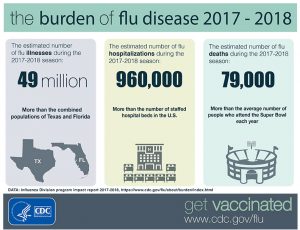Illinois health officials urge you to get the flu shot for yourself and others
By Kevin Beese Staff Reporter — October 21, 2019
The Illinois Department of Public Health and the Centers for Disease Control recommend annual flu vaccinations for everyone 6 months of age and older. (Innovative Express Care photo)
The Illinois Department of Public Health wants you to think of getting a flu shot as a form of public service.
“We have a responsibility to protect those who can’t protect themselves because they are under 6 months of age or have chronic health problems like cancer or heart disease,” said Dr. Ngozi Ezike, director of the Department of Public Health. “If you get the flu vaccine and don’t get sick, you help protect Illinoisans who are not able to be vaccinated.”
IDPH officials say they still battle misconceptions about flu shots, such as getting the shot can give a person the flu.
“It has been scientifically proven that you cannot get the flu from a flu shot,” the IDPH said in a statement. “If you’ve been exposed to the flu shortly before or immediately after getting a flu shot while the vaccine is still building to full protection, you may still get sick, but it is not because of the vaccine.”
The state Health Department said that flu vaccines have a good safety record and that hundreds of millions of Americans have safely received flu vaccines during the past 50 years.
“There has been extensive research supporting the safety of flu vaccines,” the department said in a statement.
Flu symptoms usually come on suddenly and can include:
- Fever or feeling feverish or chills (but not always)
- Coughing
- Sore throat
- Runny or stuffy nose
- Muscle or body aches
- Headaches
- Fatigue
The IDPH and Centers for Disease Control recommend annual flu vaccinations for everyone 6 months of age and older.
Department of Public Health officials note that anyone — even healthy people — can get the flu and serious problems related to the flu can happen to individuals at any age, but some people are at higher risk of developing serious flu-related complications if they get sick.
Those at higher risk are people 65 years of age and older; people with chronic medical conditions such as asthma, diabetes or heart disease; pregnant women; and children younger than 5 years old.
Public Health officials say that a carrier may not become very sick if he or she gets the flu, but those around the person can. They say a flu shot can protect an individual from getting the flu and passing it on to someone who is not able to be vaccinated.
 “Getting sick with the flu may not be bad for you, but for others, it can mean weeks of illness and in the worst cases, death,” IDPH’s Ezike said.
“Getting sick with the flu may not be bad for you, but for others, it can mean weeks of illness and in the worst cases, death,” IDPH’s Ezike said.
On average, about 8 percent of the U.S. population gets sick with the flu each season, with a range of 3 percent to 11 percent depending on the severity of the virus. Every flu season, the virus causes millions of illnesses, hundreds of thousands of hospitalizations and sometimes tens of thousands of deaths, Department of Public Health officials said.
IDPH points to recent studies that have shown flu vaccinations reduce the risk of the flu by 40 percent to 60 percent among the overall population during seasons when the flu vaccine is well-matched to the most-circulating viruses.
On the flip side, Dr. Suzanne Humphries, a prominent voice in the anti-vaccination movement, said the fact that the death rates from pneumonia and flu have remained flat despite the flu-vaccine coverage rate more than tripling since 1980 shows that the vaccines are not the answer.
The Maine doctor notes on her website, vaccinetruth.com, that deaths from flu and pneumonia declined 90 percent between 1900 and 1959 before the widespread use of flu vaccines. She said the sharp drop in deaths during that stretch can be linked to sanitation and nutrition improvements.
“The fact that no further declines have occurred in the death rate for combined flu and pneumonia deaths tells us that the only preventative for flu deaths and flu incidences is the lifestyle elements which make a healthy lifestyle,” Humphries said. “Further improvements to health as regards to the flu will have to come by renewed efforts regarding sanitation and nutrition.
“This is especially true for the area of nutrition as the real cause of the flu is the body’s need to eliminate the by-products of difficult to digest foods or food combinations. The severity of flu is similar to all other ‘contagious’ diseases in that the amount of toxic material in the body and the amount of available nutritional support elements (i.e. Vitamin C) are the main items which determine severity or success of the cleansing process which we call the ‘symptoms of the flu.’”
Humphries said there is long-term, large-population evidence that the flu vaccine does not save lives in the over 65 age group. She added the flu vaccine is not effective in any age group at preventing the flu.
“It is never safe to inject decaying matter mixed with poisons into the human body,” Humphries said.
Fighting the flu
The Illinois Department of Public Health recommends the following steps to beat the flu:
- Get vaccinated.
- Take preventative actions, with the 3 C’s
– Clean: Wash your hands with soap and water
– Cover: Use a tissue to cover your cough or sneeze
– Contain: Stay home when sick and contain your germs
- Use antivirals drugs prescribed by a doctor.







